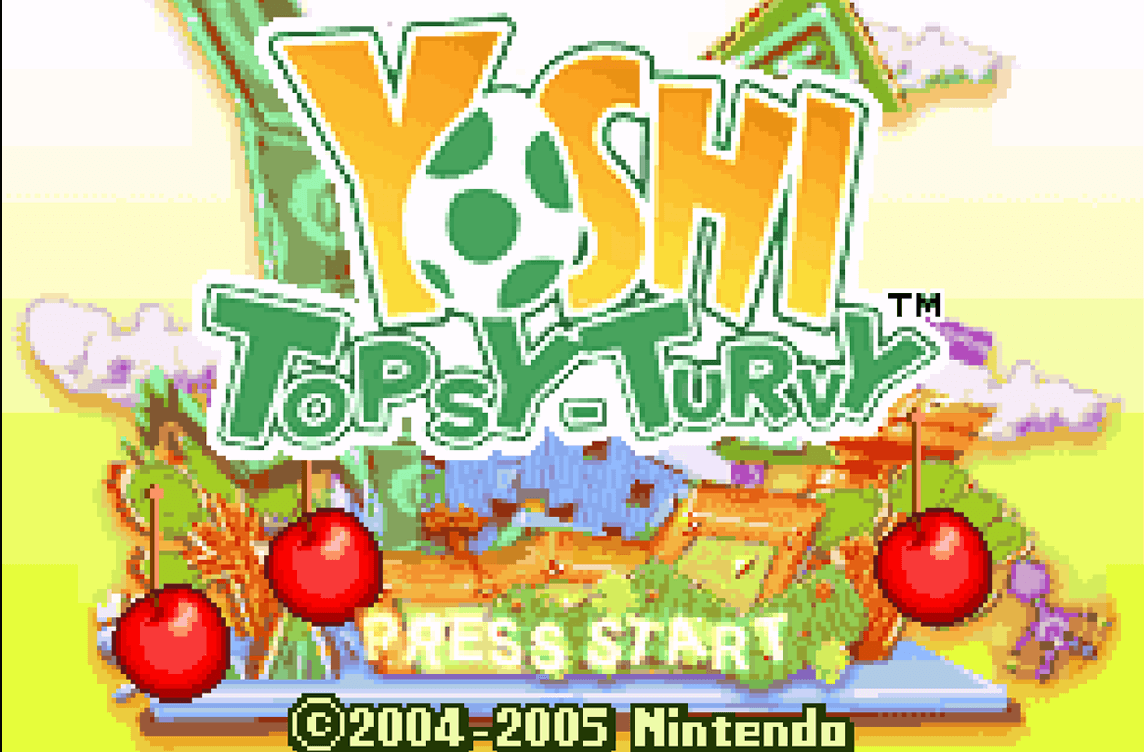More than a decade ago, Nintendo gifted gamers worldwide with what could arguably be considered the pinnacle of 2D platform games. Yoshi’s Island, an official-yet-unofficial sequel to the outstanding Super Mario World, showcased the company’s dinosaur protagonist in a brilliant light.
Yoshi continued to feature in successful game designs, including Yoshi Story on the Nintendo 64 and the polarizing Yoshi Touch & Go on the Nintendo DS. However, the trajectory took an unexpected turn with Yoshi Topsy-Turvy, an original Game Boy Advance platformer that not only failed to live up to past Yoshi game standards but also incorporated tilt technology, marking a departure from traditional controls.
This review delves into the unique concept, controls, level design, and overall execution of Yoshi Topsy-Turvy, exploring why this title stands out as an unusual misstep in Yoshi’s illustrious gaming journey.
Tilt, Twist, Traverse: Yoshi’s Gravity Adventure Unfolds!
The Unusual Concept
Yoshi Topsy-Turvy, unlike its predecessors, emerges as a unique concept spun from Yoshi’s Island’s universe. Developed by Artoon, the game plunges Yoshi and Yoshi Island into a giant pop-up book. The challenge unfolds as players complete tasks set by different spirit characters controlling each page. These tasks range from eating apples and collecting coins to defeating enemies. Each page has a specific quota, rewarding players with medals based on their performance. This not only adds a layer of challenge but also triggers a chance to play a mini-game for an extra life.

Tilt Controls: A Digital Drawback
The game introduces tilt controls through a sensor embedded in the cartridge. Unfortunately, the execution of this concept doesn’t live up to expectations. The tilt sensor’s rigidity, recognizing only three specific tilt positions, hampers the fluidity needed for a natural gaming experience. Unlike the seamless controls in games like Wario Ware Twisted, Yoshi Topsy Turvy’s tilt sensitivity feels harsh and unresponsive.
The unit’s recognition boils down to players slowly tilting the system further until the tilt is being recognized. This lack of finesse contrasts starkly with the fluid and natural tilt controls seen in Kirby’s Tilt ‘n Tumble on the Game Boy Color. Yoshi Topsy-Turvy’s controls, dependent entirely on tilt technology for gameplay and level design, suffer due to the sensor’s harsh and unforgiving nature. Surprisingly, the game doesn’t utilize the L and R buttons for the world-tilt mechanic, adding to the missed potential of the tilt concept.
Level Design: Short and Segmented
In a departure from the elaborate constructions of past Yoshi platforms, Topsy Turvy adopts single-room segments. This design choice contributes to a sense of rigidity, with challenges often lasting only seconds. While some levels demand complex tasks, others incorporate frustrating elements, such as freefalling segments with minimal room for error. The game’s challenges, divided into brief segments, leave players wanting more substantial and interconnected level designs. It’s evident that the game falls short of providing the immersive and expansive levels characteristic of Yoshi’s gaming legacy.
Collision Woes and Art Direction
Yoshi Topsy-Turvy suffers from loose collision detection, causing Yoshi to miss enemies or power-ups during jumps. The mishmash of pixel art backgrounds and rendered character sprites draws inspiration from Yoshi’s Island and Yoshi Story but falls short. Clunky character animations and poorly designed original creatures disrupt the cohesive Yoshi style, detracting from the visual experience. The character animation, a crucial aspect of any platformer, lacks the smoothness seen in the two previous Yoshi platformers, further contributing to the game’s visual inconsistencies.

Nintendo’s Uncharacteristic Misstep
Despite Nintendo’s reputation for top-tier Game Boy Advance titles, Yoshi Topsy-Turvy stands out as a misstep. The tilt concept, while promising on paper, translates into a clunky and forced gaming experience.
The game’s level designs range from challenging to frustrating, and the overall product fails to meet the standards set by its Yoshi-centric predecessors. Nintendo, a publisher known for delivering A+++ titles, couldn’t salvage Topsy Turvy from being the weakest link in its Game Boy Advance lineup.
Conclusion: A Subpar Addition to Yoshi’s Legacy
In conclusion, Yoshi Topsy-Turvy, while not falling into the category of terrible titles, lands as the weakest game Nintendo published for the Game Boy Advance.
The unfulfilled potential of tilt controls, erratic level designs, and visual inconsistencies contribute to a lackluster Yoshi experience. Topsy Turvy’s overarching issue is an overall lack of polish and ambition, often making the game feel like a glorified tech demo rather than a worthy addition to Yoshi’s illustrious gaming legacy.
Play Yoshi Topsy-Turvy Online Anywhere, Anytime!
Embark on Yoshi Topsy-Turvy’s unconventional journey, available for play on your web browser, mobile devices, and tablets. Experience Yoshi’s gravity-defying adventure seamlessly across platforms and witness firsthand the unexpected twists in Yoshi’s gaming legacy.